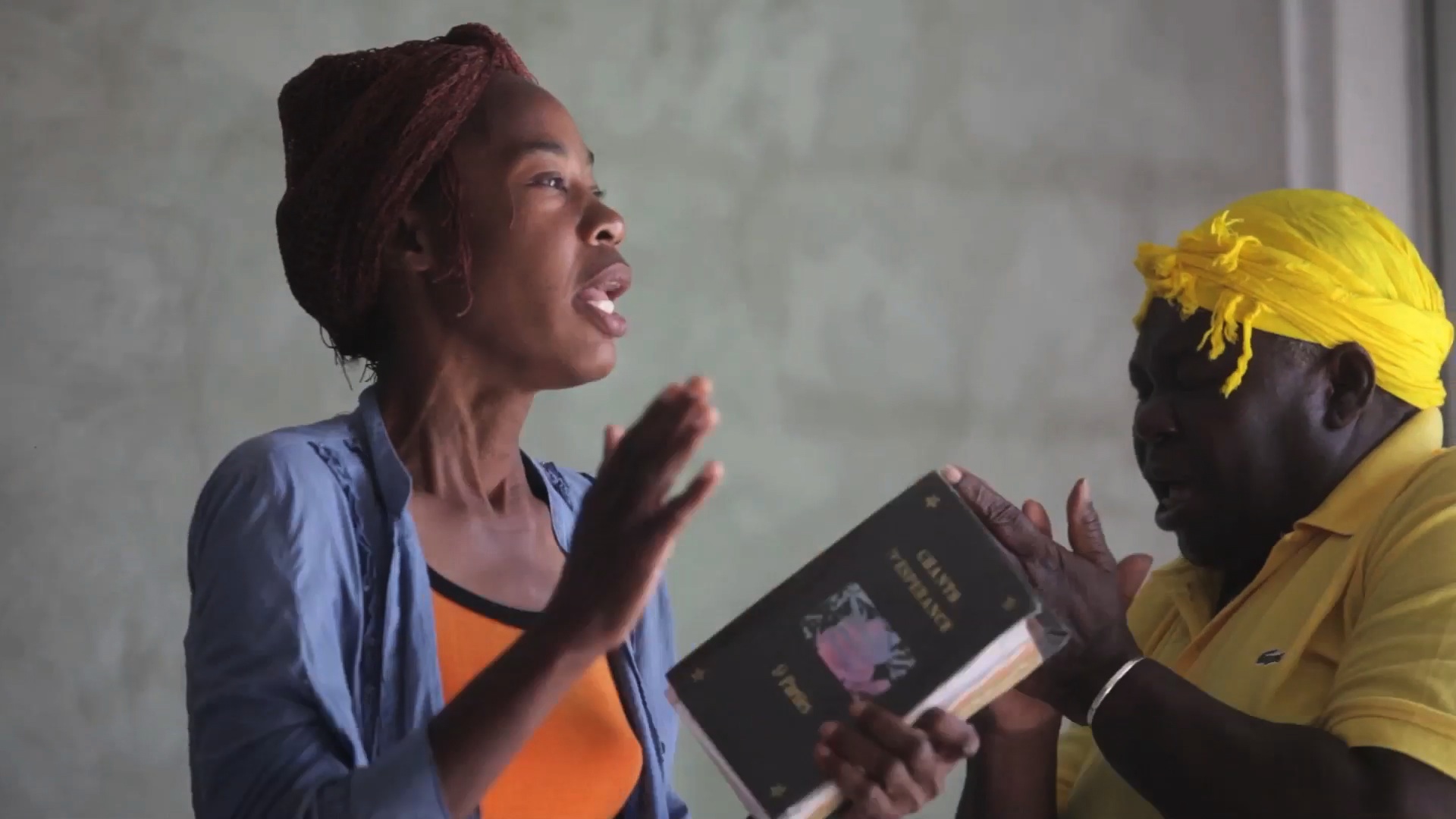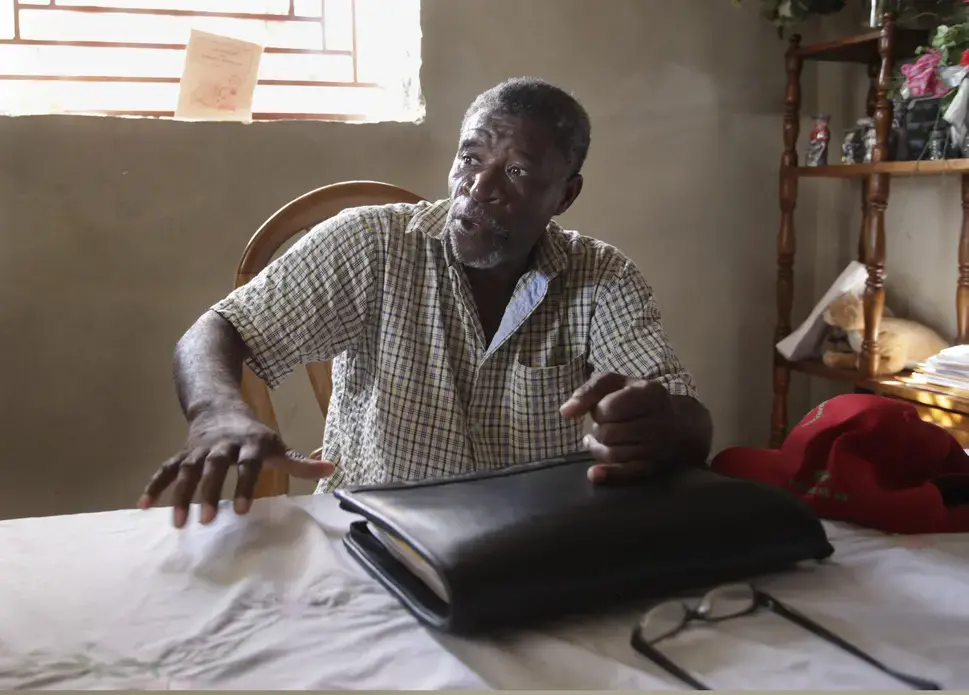ARCAHAIE, HAITI — Jean-Francois Wilson knew just what to show visiting Iowans who asked for examples of the problems his small city faces.
Wilson, the deputy mayor, ushered his American guests into a "tap-tap," a garishly painted pickup-truck taxi whose bed is fitted with wooden benches and a roof. He directed the driver to go through town, then turn down an overgrown dirt track that cuts through farm fields. The truck bumped along for a few minutes, then stopped in front of a concrete monument to good intentions gone awry.
The structure is a modern water tower, about five stories tall. It was built to provide steady water service to 45,000 residents. A United Nations agency built it about 20 years ago, Wilson said. He's not sure how much the project cost, but it must have been a small fortune.
The tower and an accompanying treatment apparatus worked well until about five years ago, when the pump that drew water into the tower broke. Residents have resumed using latrines instead of toilets, and many of them draw drinking water from streams teeming with bacteria.
A new pump would cost about $18,000 in American money, an impossible sum for Wilson's impoverished city. No aid groups have been willing to help his government pay for it, he said.
"All the big organizations, they just keep the money themselves," he said in Creole, rubbing his palms together in a cash-collecting gesture. "They don't give that much."
Independent experts on aid to Haiti said the empty water tower is an example of a common problem.
"Things break down, and they stay broken down forever," said Vijaya Ramachandran, a senior fellow for the Center for Global Development. She said aid groups and donors tend to be more excited about building new projects than about maintaining existing ones.
Ramachandran, a Washington, D.C., researcher who has studied the aftermath of the 2010 Haitian earthquake, said about $9 billion in aid poured in over three years. About a third of that came from the U.S. government, a third from other governments and a third from individual donors, mainly Americans. Much of that money apparently went to pay the salaries and expenses of Americans and other foreigners, she said. Many foreign officials drove new SUVs, rented nice houses and trucked in drinking water and food for their teams.
"Basically, everybody got flooded with cash—everybody but the Haitians."
Groups often skirt government
Ramachandran said the biggest problem is that little of the assistance has been routed through Haiti's government or local organizations. Instead, services have been provided directly by foreign nonprofits or contractors.
The intentions are mainly good, she said, and there's no doubt that aid groups saved many lives in the quake's aftermath. But all that money and effort have done little to prepare Haiti for the next earthquake, hurricane or other disaster.
For example, she said, Haiti's government has struggled to rebuild its main hospital in the capital city of Port-au-Prince. Countless medical groups have sent doctors and medication into the capital, but few have shown interest in helping the country build up its own health system.
"That's just not what they do," she said.
Dr. Chris Buresh, a University of Iowa physician who leads U.S. medical teams in the Arcahaie area, has heard the widespread criticism that Haitians' faith in their government erodes further when outside groups provide freelance help.
"It's true, and I hate that," Buresh said one night outside his group's clinic. "Having said that, it's not that easy working with the Haitian government, because it's hard to know who to talk to and how to get ahold of certain people and what the system is. If there was a system that we could go through where we could kind of sign up ... we would do that. … They should absolutely be in charge of who's here and what they're doing."
The wealthy Haitian couple who own the compound where the Iowans work told Buresh that they'd registered the clinic with the Haitian government, but he said he didn't know the details.
The next morning, Buresh chuckled when his stated wish for a connection to the Haitian government came true — in the form of two SUVs full of inspectors carrying clipboards. The inspection included interviews with the American doctors and nurses, which crimped their work for several hours. But Buresh said it was good to see the Haitian government taking steps to ensure medical care was being provided properly.
A top United Nations official in Haiti said such oversight is becoming more common. Osian Jones, the U.N.'s assistant country director for development in Haiti, said the Haitian government had gained significant strength over several years leading up to 2010.
"But a lot of that basically was washed away with the earthquake," he said.
Many officials died as their headquarters buildings collapsed, he said, leaving the government all but paralyzed. Now the government is showing clear signs of regaining its feet, he said, and the United Nations and other international agencies are focused on encouraging it.
Jones' office didn't have many details about what happened with the Arcahaie water tower because it was built by a U.N. agency no longer working in Haiti. Officials said their records indicate responsibility for the water tower was handed over to local authorities, which is usually the goal with such projects. They try to ensure that locals have the ability to sustain improvements, though that can be difficult to guarantee.
How to increase oversight?
Laurent Dubois, a Duke University professor who has written several books about Haiti's history, said there's little dispute about the need for the country's government to oversee and coordinate development efforts.
"Everybody agrees that should be the endpoint. But how do you get to that endpoint?" he said.
Dubois said it's telling that the country's National Palace, which was irreparably damaged in the earthquake, wasn't demolished until recently because the government lacked money for the project. Meanwhile, several luxury hotels have been built to serve foreigners visiting Port-au-Prince.
The professor said corruption has long plagued Haiti's government, partly because foreign business interests have cultivated it. But he said the government has the potential to straighten out and take responsibility for running the country.
For now, the government will be heavily dependent on foreign money for its budget because it can't raise much tax revenue from its poor citizens. Even so, he said, it should gain more oversight of the hodgepodge of thousands of aid projects.
Dubois said more independent aid groups are working in Haiti than in any other country. That's probably because Haiti is so close to the United States, allowing Americans to visit quickly and inexpensively. In the 1950s, about 200,000 Americans a year traveled to Haiti for relaxing tropical vacations, he said. Roughly that number now travel there, mainly to volunteer.
Ignorance of history hurts efforts
Many Americans participate in short mission trips, often organized by churches, without having much knowledge about the country. Dubois said people go with the best of intentions, but he wonders about the impressions they come home with if they do nothing but volunteer at orphanages or other charitable projects.
"There's sometimes this sense that Haiti is nothing more than a series of very tragic stories," he said.
Part of the problem is that mission-trip organizers often have exaggerated fears of crime, and they tightly restrict interactions with everyday Haitians, he said. Also, relatively few of the trips go to rural Haiti, which tends to be safer than Port-au-Prince.
Dubois added that American visitors sometimes add to the friction by being unaware of the history between the two countries. That history includes the U.S. Marine Corps' occupation of Haiti from 1915 to 1934, plus initial American support for the ruinous dictatorship of the Duvalier family, which ruled from 1957 to 1986. Most Haitians are familiar with those facts, and know about the United States' on-again, off-again aid policies in recent decades.
Dubois said Americans and other foreigners should make sure their projects are what local people want, and they should strive to have Haitians providing service to other Haitians.
He also noted that Haiti's president, Michel Martelly, is trying to encourage foreign corporations to set up production facilities in his country. So far, Dubois said, the policy hasn't had a big effect.
The professor also would like to see more efforts to help small farmers grow and market crops, such as mangoes, coffee and rice, which they can use to feed their country.
Writer: Do what can be sustained
Amy Wilentz, an American journalist who has been writing about Haiti since 1985, said donors naively believed that infusions of money would quickly help the situation.
"It's really not easy to know what to do with billions of dollars in Haiti," she said. "That's counterintuitive, right? You know how much suffering there is in Haiti. But how do you spend the money in a proper, humane, decent way?"
Wilentz stressed that foreign groups should start only those projects that Haitians can sustain. The water tower in Arcahaie, she said, showed how the local government remains so weak that it can't provide basic repairs to a critical system.
The long-term answer isn't for the United Nations to come fix the pump on the water tower it built, she said. The answer is to strengthen Haiti's government so it can take care of such matters. Americans should continue trying to help Haiti, she said, but they should strive for the most effective ways to do it.
Raphael Cook, a spokesman for U.S. AID, which oversees most American government aid, said the agency is working to include the Haitian government more in recovery projects. Cook said about $190 million of the $1.6 billion his agency has spent on recovery, reconstruction and development in Haiti has gone to improve the Haitian government's capabilities.
Ramachandran estimates that foreign aid groups provide 80 percent of Haiti's social services, such as health care and education. Haitians learn to rely on such groups for help, she said, but there's no guarantee groups will stay in the long run, especially if their donors lose interest in the country.
She asked: "What's going to happen if a lot of these guys pack up and go away?"







